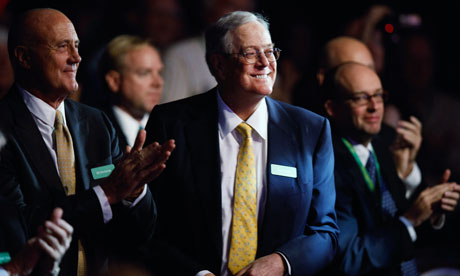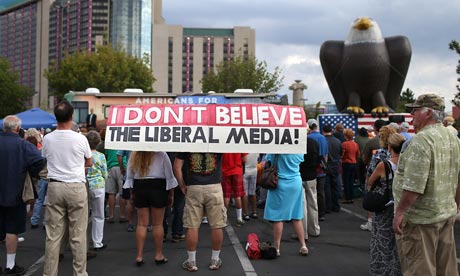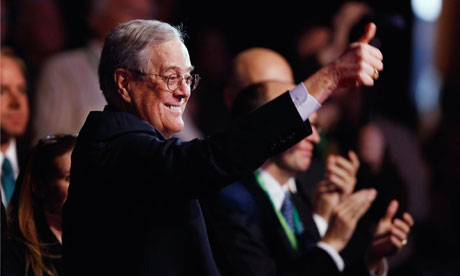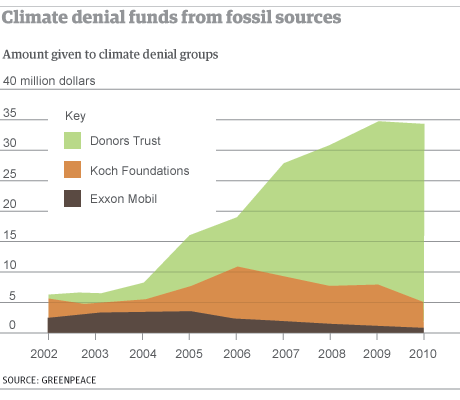Billionaires control the political conversation by staying hidden and paying others to promote their brutal agendas

David Koch, of Koch
Industries, pictured here in his role as chairman of Americans for
Prosperity at the Defending the American Dream Summit in November 2011.
Photograph: Chip Somodevilla/Getty Images
The two organisations – the Donors' Trust and the Donors' Capital Fund – were set up as political funding channels for people handing over $1m or more. They have financed 102 organisations which either dismiss climate science or downplay the need to take action. The large number of recipients creates the impression of many independent voices challenging climate science. These groups, working through the media, mobilising gullible voters and lobbying politicians, helped to derail Obama's cap and trade bill and the climate talks at Copenhagen. Now they're seeking to prevent the US president from trying again.
This covers only part of the funding. In total, between 2002 and 2010 the two identity-laundering groups paid $311m to 480 organisations, most of which take positions of interest to the ultra-rich and the corporations they run: less tax, less regulation, a smaller public sector. Around a quarter of the money received by the rightwing opinion swarm comes from the two foundations. If this funding were not effective, it wouldn't exist: the ultra-rich didn't get that way by throwing their money around randomly. The organisations they support are those that advance their interests.
A small number of the funders have been exposed by researchers trawling through tax records. They include the billionaire Koch brothers (paying into the two groups through their Knowledge and Progress Fund) and the DeVos family (the billionaire owners of Amway). More significantly, we now know a little more about the recipients. Many describe themselves as free-market or conservative thinktanks.
Among them are the American Enterprise Institute, American Legislative Exchange Council, Hudson Institute, Competitive Enterprise Institute, Reason Foundation, Heritage Foundation, Americans for Prosperity, Mont Pelerin Society and Discovery Institute. All pose as learned societies, earnestly trying to determine the best interests of the public. The exposure of this funding reinforces the claim by David Frum, formerly a fellow of the American Enterprise Institute, that such groups "increasingly function as public relations agencies".
One name in particular jumped out at me: American Friends of the IEA. The Institute of Economic Affairs is a British group that, like all the others, calls itself a free-market thinktank. Scarcely a day goes by when its staff aren't interviewed in the broadcast media, promoting the dreary old billionaires' agenda: less tax for the rich, less help for the poor, less spending by the state, less regulation for business. In the first 13 days of February, its people were on the BBC 10 times.
Never have I heard its claim to be an independent thinktank challenged by the BBC. When, in 2007, I called the institute a business lobby group, its then director-general responded, in a letter to the Guardian, that "we are independent of all business interests". Oh yes?
The database published by the Canadian site desmogblog.com shows that American Friends of the IEA has (up to 2010) received $215,000 from the two secretive funds. When I spoke to the IEA's fundraising manager, she confirmed that the sole purpose of American Friends is to channel money to the organisation in London. She agreed that the IEA has never disclosed the Donors' Trust money it has received. She denied that the institute is a sockpuppet organisation: purporting to be independent while working for some very powerful US interests.
Would the BBC allow someone from Bell Pottinger to discuss an issue of concern to its sponsors without revealing the sponsors' identity? No. So what's the difference? What distinguishes an acknowledged public relations company taking money channelled by a corporation or a billionaire from a so-called thinktank, funded by the same source to promote the same agenda?
The IEA is registered with the Charity Commission as an educational charity. The same goes for Nigel Lawson's climate misinformation campaign (the Global Warming Policy Foundation) and a host of other dubious "thinktanks". I've said it before and I'll say it again: it is outrageous that the Charity Commission allows organisations that engage in political lobbying and refuse to reveal their major funders to claim charitable status.
This is the new political frontier. Corporations and their owners have learned not to show their hands. They tend to avoid the media, aware that they will damage their brands by being seen to promote the brutal agenda that furthers their interests. So they have learned from the tobacco companies: stay hidden and pay others to do it for you.
They need a network of independent-looking organisations that can produce plausible arguments in defence of their positions. Once the arguments have been developed, projecting them is easy. Most of the media is owned by billionaires, who are happy to promote the work of people funded by the same class. One of the few outlets they don't own – the BBC – has been disgracefully incurious about the identity of those to whom it gives a platform.
By these means the ultra-rich come to dominate the political conversation, without declaring themselves. Those they employ are clever and well-trained, with money their opponents can only dream of. They are skilled at rechannelling public anger that might otherwise be directed at their funders: the people who tanked the economy, who use the living planet as their dustbin, who won't pay taxes and demand that the poor must pay for the mistakes of the rich. Anger, thanks to the work of these hired hands, is instead aimed at the victims or opponents of the billionaires: people on benefits, trade unions, Greenpeace, the American Civil Liberties Union.
The answer, as ever, is transparency. As the so-called thinktanks come to play an ever more important role in politics, we need to know who they are working for. Any group – whether the IEA or Friends of the Earth – that attempts to influence public life should declare all donations greater than £1,000.
We've had a glimpse of who's paying. Now we need to see the rest of the story.



